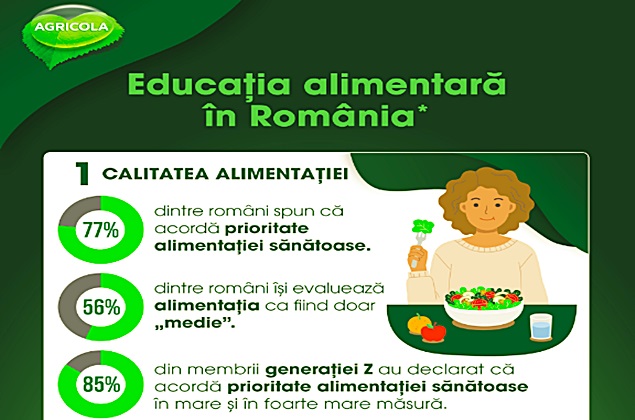1244

Romanians Aim for Healthier Eating, But Gaps Remain Between Intention and Practice
Romanians want to eat healthily, yet findings from the "Food Education in Romania" study, conducted by AGRICOLA and iVox, reveal a significant gap between intention and actual behavior.
Over 77% of respondents said they prioritize healthy eating to a great or very great extent. However, only 4 in 10 rate the quality of their diet as “good,” while 5 in 10 describe it as “average.”
According to the research conducted between March 19–31, 2025, members of Generation Z are the most concerned with their diet — more than 85% reported placing high importance on healthy eating.
This trend may be linked to young people's easy access to information, especially on social media platforms, where they increasingly engage with influencers who promote a healthy lifestyle.
The primary motivations for choosing a healthy diet include long-term health prevention (75.19%), daily well-being (49.95%), and the desire to be more productive (37.16%).
Beyond nutrition, Romanians’ efforts to maintain a balanced lifestyle include getting quality sleep (57.14%), avoiding excessive sugar, salt, and fat consumption (48.01%), and engaging in physical activity two to three times per week (44.15%).
“At Agricola, we believe that informed and conscious choices are the foundation of a healthy diet and balanced lifestyle. That’s why we encourage consumers to pay attention to what’s on their plates, read labels, check ingredient origins, and make responsible choices. We are proud to offer products that meet the highest standards of quality and food safety, turning every meal into a celebration of authentic taste and a natural step toward a healthier life,” said Cristian Călin, Public Relations and Communications Manager of the Agricola Group.
Where Romanians Get Their Nutrition Information
When it comes to their level of knowledge about healthy eating, only 13.75% of respondents consider themselves very well informed and say they apply nutritional principles daily. Another 56.71% report having a solid understanding but don’t always put it into practice, while 27.5% say they are only partially informed.
Only 47% consult doctors or nutrition experts, while 1 in 5 respondents rely on social media — a noticeable trend among Generation Z, where over 37% get their information from TikTok, Instagram, or YouTube. For Millennials, experts remain the main source of information (51.13%), while Generation X (51.27%) primarily uses specialized blogs.
Reading Labels — But Struggling with Interpretation
While half of the respondents frequently read product labels before purchasing, over 80% either do not recognize harmful ingredients or have difficulty identifying them. When checking labels, most people focus on the list of ingredients (78.95%), followed by the amount of sugar and sweeteners (48.55%), and nutritional values (42.86%).
For those in Generation X (ages 45–60), the ingredient list is the most important detail to review (81.52%). Yet, only 20% of all respondents clearly understand the differences between terms like “natural,” “organic,” and “healthy.” However, 65% correctly understand the concept of naturally enriched products.
Ingredient origin is very important to 21.7% of respondents, who say they prefer locally sourced foods or trusted brands, while over 50% reported choosing higher-quality products whenever possible.
“The study reveals something encouraging — Romanians genuinely want to take better care of their health through improved dietary choices. But there's still a critical step between intention and everyday habits: understanding what healthy eating truly means. We need more accessible and empathetic nutritional education — in schools, in families, and in the online spaces where people seek answers. Real change starts with a small but conscious act at every meal,” said Dr. Amalia Arhire, endocrinologist, diabetes and nutrition specialist, and PhD in medicine.
Romanians Appreciate Organic Products, But Price Is a Barrier
When asked why they choose organic products, 39% of respondents said they are healthier and contain fewer additives and pesticides — with an even higher rate among Generation Z (44.64%). Other reasons include better taste (20.62%) and a positive environmental impact (16.54%).
Additionally, 57% of respondents said they would pay more for organic food — but only if the price difference is no more than 10–15%. Price remains the top deciding factor for almost a quarter of respondents (23%).




